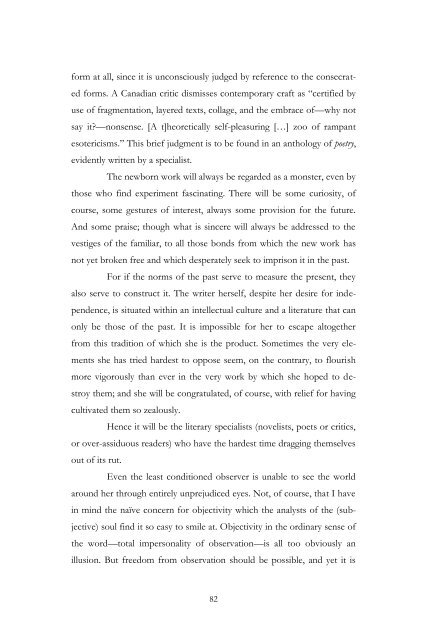CONTACT WITH POETS
Ev4Qw3
Ev4Qw3
You also want an ePaper? Increase the reach of your titles
YUMPU automatically turns print PDFs into web optimized ePapers that Google loves.
form at all, since it is unconsciously judged by reference to the consecrated<br />
forms. A Canadian critic dismisses contemporary craft as “certified by<br />
use of fragmentation, layered texts, collage, and the embrace of—why not<br />
say it?—nonsense. [A t]heoretically self-pleasuring […] zoo of rampant<br />
esotericisms.” This brief judgment is to be found in an anthology of poetry,<br />
evidently written by a specialist.<br />
The newborn work will always be regarded as a monster, even by<br />
those who find experiment fascinating. There will be some curiosity, of<br />
course, some gestures of interest, always some provision for the future.<br />
And some praise; though what is sincere will always be addressed to the<br />
vestiges of the familiar, to all those bonds from which the new work has<br />
not yet broken free and which desperately seek to imprison it in the past.<br />
For if the norms of the past serve to measure the present, they<br />
also serve to construct it. The writer herself, despite her desire for independence,<br />
is situated within an intellectual culture and a literature that can<br />
only be those of the past. It is impossible for her to escape altogether<br />
from this tradition of which she is the product. Sometimes the very elements<br />
she has tried hardest to oppose seem, on the contrary, to flourish<br />
more vigorously than ever in the very work by which she hoped to destroy<br />
them; and she will be congratulated, of course, with relief for having<br />
cultivated them so zealously.<br />
Hence it will be the literary specialists (novelists, poets or critics,<br />
or over-assiduous readers) who have the hardest time dragging themselves<br />
out of its rut.<br />
Even the least conditioned observer is unable to see the world<br />
around her through entirely unprejudiced eyes. Not, of course, that I have<br />
in mind the naïve concern for objectivity which the analysts of the (subjective)<br />
soul find it so easy to smile at. Objectivity in the ordinary sense of<br />
the word—total impersonality of observation—is all too obviously an<br />
illusion. But freedom from observation should be possible, and yet it is<br />
82


